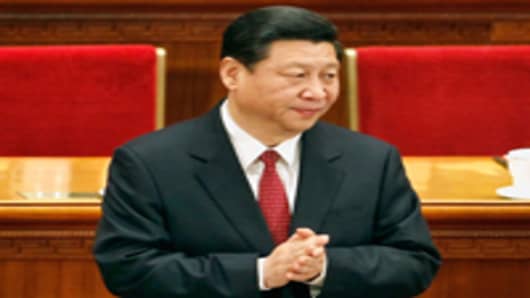Rumors have been growing over the whereabouts of Xi Jinping, the man widely tipped to be the next president of China, but Chinese authorities and the media have remained silent about his health or whereabouts.
Xi, China’s current vice president, has not been seen at a public event for eleven days, and has missed meetings with the U.S. Secretary of State Hillary Clinton and Singapore Prime Minister Lee Hsien Loong.
On Tuesday, a Chinese foreign ministry spokesman Hong Lei declined to give any more information on Xi. When asked at a press conference if he could confirm whether Xi was alive he bluntly replied: "I hope you can ask a serious question."
Speculation has begun to grow with sources telling Reuters that a back injury is the reason for Xi’s absence. Other rumors suggest Xi has suffered a heart attack or stroke, or even an assassination attempt.
Miranda Carr, Head of China Research at the investment bank NSBO told CNBC that the uncertainty that is being created by the speculation is causing concern, even if people are not giving much credence to the more fantastic rumours.
Xi's absence comes just months after another scandal surrounding another top leader, Bo Xilai, the former Communist Party chief in Chongqing.
Bo was sacked in April from his party post and his wife was recently given a suspended death sentence for the murder of British businessman Neil Heywood.
According to Carr, given the Bo case, anything which feeds the current rumour mill will affect investor sentiment.
“It is a short-term phenomenon, however, and by next month we should have much more clarity after the Party Congress,” she said.
Frederic Neumann, Managing Director and Co-Head of Asian Economics Research at HSBC says investors are beginning to worry about the level of transparency with the country's elite.
“There’s certainly a lot of nervousness,” he told CNBC Wednesday.
“It’ll be easy just to show Xi Jinping and roll him out to the media and say ‘here he is’ and let him give a speech. But this hasn’t happened yet so it does raise some questions,” he said. Neumann said he was getting increasingly concerned with every day that passes.
In October, China is due to hold the 18th National Congress of the Communist Party, during which Xi is widely expected to be named president.
Neumann said there were two key reasons why investors are nervous. Firstly, he said, there would be political infighting if something had indeed happened to Xi.
Neumann also said that China’s economy needed some monetary stimulus after experiencing a sharp slowdown and any delay in this stimulus because of political uncertainty would affect growth further.
“The government needs to act quickly and this will just delay the action and therefore raise the risk that China’s not going to rebound till possibly the middle of next year, if this story was indeed true,” he said.
August data from China showed exports fell by more than expected and growth in industrial output was at its slowest pace for more than three years.
Economists have altered their forecasts for China’s gross domestic product (GDP)growth this year. The International Monetary Fund in July lowered its 2012 growth forecast to 8 percent from 8.2 percent.
David Owen, Chief European Economist at Jefferies International told CNBC that this could have a knock-on effect in Europe.
“If Asia slows that removes another plank to getting a recovery going here and may be pushes back the time of the recovery in the euro zone and the U.K. further,” he told CNBC Wednesday.
He said that the German private sector was particularly exposed to China and a further slowdown could push Germany back into recession.


